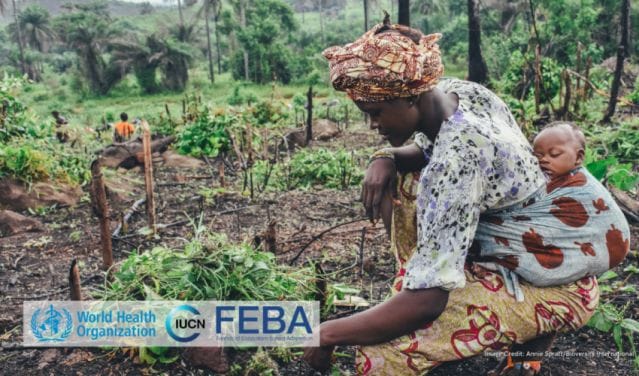Leading experts engaged in the science-policy interface of public health, biodiversity, and climate change will collaborate in an innovative initiative led by the WHO and IUCN to help guide decision makers toward a healthier, greener and more sustainable future as they navigate the challenges of the post-COVID-19 era.
Based on the strong premise that many of the solutions to the common environmental and public health threats that we face can only be found through iterative, cross-sectoral and interdisciplinary knowledge exchange, the working group will catalyse the development of coherent and inclusive, evidence-based policies that promote a healthy recovery, help prevent future health risks associated with ecosystem degradation, biodiversity loss and climate change, and chart a common path toward the achievement of the Sustainable Development Goals (SDGs).
The World Health Organization (WHO), through its Department of Environment, Climate Change and Health (ECH), the International Union for the Conservation of Nature (IUCN), and the Friends of Ecosystem-based Adaptation (FEBA) network are establishing a new expert working group (EWG) on Biodiversity, Climate, One Health and Nature-based Solutions. This initiative builds upon and expands the scope of work carried out by the Inter-agency Liaison Group on biodiversity and health, co-chaired by WHO and the Convention on Biological Diversity between 2015 and 2020.
The EWG will develop guidance and tools to support the operationalization of One Health approaches and Nature-based Solutions by: (1) identifying co-benefits and trade-offs for human and ecosystem health, (2) strengthening social and ecological resilience and (3) supporting a healthy, green and just recovery from COVID-19.
The EWG will aim to catalyze health sector leadership, while ensuring cross-sectoral policy alignment, coordination and coherence across international policy processes. It will focus on embedding ecosystem health, biodiversity and climate change in One Health policies, plans and projects, and driving knowledge exchange on the environmental and social determinants of health. The group will also seek to systematically integrate health co-benefits in the development, design and implementation of Nature-based Solutions to climate change.

The work of the EWG will:
1. Examine the relationships between biodiversity, ecosystem degradation, climate and (infectious and noncommunicable) disease emergence, with a view to maximizing health co-benefits of sustainable ecosystem management and restoration.
2. Assess the role of environmental, social and economic determinants of health and develop tools to strengthen cross-sectoral collaboration, policy coherence and the operationalization of the One Health Approach;
3. Mainstream health and biodiversity to support a transition toward sustainable and healthy food systems in ways that also support: dietary diversity; the sustainable management and use of biodiversity in agriculture, fisheries and forestry ecosystems; regenerative agriculture practices; crop diversity and sustainable harvesting practices; sustainable fisheries; sustainable management of livestock, wildlife, terrestrial, coastal and marine ecosystems; climate change adaptation and mitigation; and the interactions between these drivers, responses, and outcomes;
4. Examine the contribution of biodiversity and green and blue infrastructure to support the creation of health-promoting environments and improve mental and physical health outcomes in both rural and urban areas, including the development and implementation of Nature-based climate Solutions focused on health co-benefits;
5. Evaluate climate change as a cross-cutting driver and amplifier of ecosystem degradation, biodiversity loss and ill health, and developing policy guidance to maximize the health co-benefits of ecosystem-based adaptation and mitigation efforts.
The first meeting of the EWG will be convened in April 2021. Meetings of the EWG will be complemented by consultation and briefing sessions with WHO and IUCN partners and constituencies to review the findings, further drive cross-sectoral leadership, engage across communities of practice, and mutually support capacity-building and advocacy efforts.
For any further questions about the EWG, please contact Cristina Romanelli (WHO) and Emily Goodwin (IUCN).
About WHO: WHO works worldwide to promote health, keep the world safe, and serve the vulnerable. Working with 194 Member States, across six regions, and from more than 150 offices, WHO is united in a shared commitment to achieve better health for everyone, everywhere. The goal of WHO is to ensure that a billion more people have universal health coverage, to protect a billion more people from health emergencies, and provide a further billion people with better health and well-being.
About IUCN: Created in 1948, IUCN is the world’s largest and most diverse environmental network, harnessing the knowledge, resources and reach of more than 1,400 Member organisations and some 15,000 experts. Its broad membership enables IUCN to fill the role of incubator and trusted repository of best practices, tools and international standards. IUCN provides a neutral space in which diverse stakeholders including governments, NGOs, scientists, businesses, local communities, indigenous peoples organisations and others can work together to forge and implement solutions to environmental challenges, address climate change, reverse habitat loss, restore ecosystems and improve people’s well-being.
About Friends of EbA (FEBA): FEBA is a global collaborative network of 80+ agencies and organisations involved in Ecosystem based Adaptation (EbA) working jointly to share experiences and knowledge, to improve the implementation of EbA related activities on the ground, and to have a stronger and more strategic learning and policy influence on EbA. EbA has paved the way for the wide uptake of working with nature as a cornerstone of adaptation strategies to simultaneously address climate risks, the biodiversity crisis, and human wellbeing. FEBA works to synthesise multi-stakeholder knowledge on EbA; disseminate this knowledge by convening the global EbA community around high-level events, technical workshops, and expert working groups; and raise awareness and understanding of EbA in adaptation planning processes and multilateral policy frameworks. The CBD COP recognizes FEBA as a key partner “to support Parties in their efforts to promote ecosystem-based approaches to climate change adaptation” (Decision 14/5).
